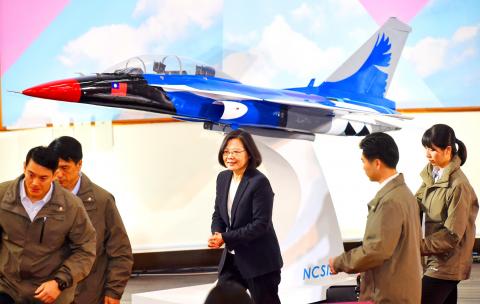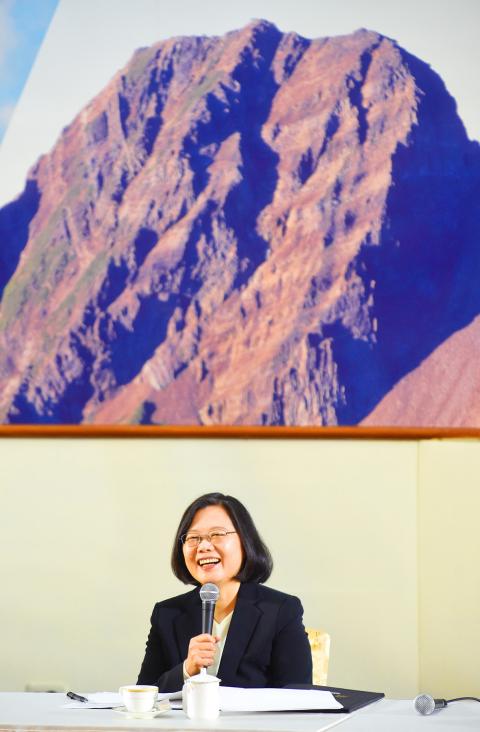President Tsai Ing-wen (蔡英文) yesterday vowed to continue efforts to increase Taiwan’s defense self-reliance, which she said is critical to the nation’s sovereignty and peace in the region, but revealed that her administration is compiling a list of arms and equipment it plans to purchase from the US.
Tsai made the remarks during a year-end gathering with the media at the Taoyuan-based Chungshan Institute of Science and Technology, the main agency responsible for the nation’s research, development and production of defense technology and weapons.
The choice of venue was considered unusual for such an event and was believed to be a demonstration of the president’s emphasis on the domestic defense industry.

Photo: Liu Hsin-de, Taipei Times
“How to find Taiwan’s role and way out amid increasing variables in the regional and global contexts is one of the issues that has taken up most of my attention since taking office,” Tsai said, citing China’s apparent attempts at military expansion, heightened tensions on the Korean Peninsula, and strategic competition between Beijing and Washington.
Against such a backdrop, increasing the nation’s defense self-reliance is the key to safeguarding its sovereignty and maintaining regional peace and prosperity, she said.
“It is the ultimate protection for our national security,” Tsai said.

Photo: Liu Hsin-de, Taipei Times
Singling out a few of the institute’s achievements, Tsai said the domestically developed Teng Yun uncrewed aerial vehicle is soon to begin mass production, while a next-generation jet trainer — jointly developed and manufactured by the institute and a local company — is to make its maiden flight in 2020 as scheduled.
However, she said the nation would still turn to its friends, such as the US, for help to make up for insufficiencies.
“Over the past 500 days, we have conducted a thorough examination of our overall defense strategies and capabilities. We are indeed having an internal discussion on what we plan to acquire from the US in the next phase,” Tsai said, adding that the government would discuss the matter with Washington when the list is ready.
In late June, US President Donald Trump’s administration announced the sale of a US$1.42 billion arms package to Taiwan, the first since Trump’s inauguration in January, which included Mark 48 heavyweight torpedoes, AGM-88 high-speed anti-radiation missiles, AN/SLQ-32 shipboard electronic warfare suite upgrades and RIM-66 Standard missile components.
In addition to self-reliance in defense, Tsai said she aims to address the problem of low incomes among young people.
She said she plans to assuage the problem in five ways: facilitating industrial transformation, pushing for a “minimum wage act,” offering vocational counseling to low-income earners, encouraging corporation-led pay hikes and providing social housing and other welfare policies to alleviate young people’s burdens.
As her administration’s handling of labor law amendments and the pending legalization of same-sex marriage have met with strong criticism from young voters, Tsai was asked whether the perceived reneging on her campaign promises could affect the Democratic Progressive Party’s performance in next year’s local elections.
“We understand the younger generation’s unrest, their high ideals and their hope that their values can be quickly realized in a way they imagined ... but we, as the ruling party, have to face problems from a more realistic perspective, and spend time persuading and communicating, as our society is filled with different opinions,” Tsai said.
She said she hoped that one day, young people would realize that their leader has always endeavored to realize the shared values of Taiwanese society, despite doing so at a pace not to their satisfaction.
Turning to cross-strait issues, Tsai said that despite China’s increasingly frequent military activity in the region, she believed its leader is a “rational decisionmaker” who has never considered taking military action against Taiwan.
Although high-level communication across the Taiwan Strait has been suspended since her inauguration in May last year, Tsai said she hoped to cooperate with Beijing in tackling air pollution.
“Air pollution is not about politics, because it concerns the health of everyone. We think this issue is suitable for further cross-strait communications,” she said.

The Ministry of Foreign Affairs (MOFA) yesterday said it is closely monitoring developments in Venezuela, and would continue to cooperate with democratic allies and work together for regional and global security, stability, and prosperity. The remarks came after the US on Saturday launched a series of airstrikes in Venezuela and kidnapped Venezuelan President Nicolas Maduro, who was later flown to New York along with his wife. The pair face US charges related to drug trafficking and alleged cooperation with gangs designated as terrorist organizations. Maduro has denied the allegations. The ministry said that it is closely monitoring the political and economic situation

UNRELENTING: China attempted cyberattacks on Taiwan’s critical infrastructure 2.63 million times per day last year, up from 1.23 million in 2023, the NSB said China’s cyberarmy has long engaged in cyberattacks against Taiwan’s critical infrastructure, employing diverse and evolving tactics, the National Security Bureau (NSB) said yesterday, adding that cyberattacks on critical energy infrastructure last year increased 10-fold compared with the previous year. The NSB yesterday released a report titled Analysis on China’s Cyber Threats to Taiwan’s Critical Infrastructure in 2025, outlining the number of cyberattacks, major tactics and hacker groups. Taiwan’s national intelligence community identified a large number of cybersecurity incidents last year, the bureau said in a statement. China’s cyberarmy last year launched an average of 2.63 million intrusion attempts per day targeting Taiwan’s critical

‘SLICING METHOD’: In the event of a blockade, the China Coast Guard would intercept Taiwanese ships while its navy would seek to deter foreign intervention China’s military drills around Taiwan this week signaled potential strategies to cut the nation off from energy supplies and foreign military assistance, a US think tank report said. The Chinese People’s Liberation Army (PLA) conducted what it called “Justice Mission 2025” exercises from Monday to Tuesday in five maritime zones and airspace around Taiwan, calling them a warning to “Taiwanese independence” forces. In a report released on Wednesday, the Institute for the Study of War said the exercises effectively simulated blocking shipping routes to major port cities, including Kaohsiung, Keelung and Hualien. Taiwan would be highly vulnerable under such a blockade, because it

UNDER WAY: The contract for advanced sensor systems would be fulfilled in Florida, and is expected to be completed by June 2031, the Pentagon said Lockheed Martin has been given a contract involving foreign military sales to Taiwan to meet what Washington calls “an urgent operational need” of Taiwan’s air force, the Pentagon said on Wednesday. The contract has a ceiling value of US$328.5 million, with US$157.3 million in foreign military sales funds obligated at the time of award, the Pentagon said in a statement. “This contract provides for the procurement and delivery of 55 Infrared Search and Track Legion Enhanced Sensor Pods, processors, pod containers and processor containers required to meet the urgent operational need of the Taiwan air force,” it said. The contract’s work would be